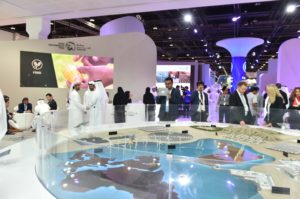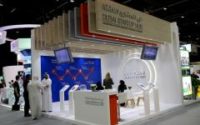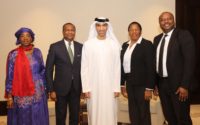Middle East To Help Boost Smart Cities Technology Market To USD 1.7 Trillion By 2023
Increased adoption of automation will play a crucial role in boosting the global smart cities market to USD 1.7 trillion by 2023, industry experts said today ahead of the World Future Energy Summit, to be staged in Abu Dhabi in January 2020.
The event’s 2020 edition is set to feature the launch of a dedicated Smart Cities Expo & Forum, which will explore smart city innovations across six verticals: smart and autonomous transportation; cybersecurity and public safety in smart cities; green buildings; energy efficiency; and urban planning. The Middle East is driving smart city innovation, from the UAE’s Masdar City, Bee’ah headquarters, and hyperloop connecting Abu Dhabi to Dubai, to Saudi Arabia’s NEOM smart city, and Egypt’s New Administrative Capital in East Cairo.
Among the top 102 smart cities in the IMD Smart City 2019 Index, Dubai (#45) and Abu Dhabi (#56) lead the Arab World. The Middle East and Africa’s smart cities market is set to more than double by 2022, according to KPMG. Globally, Navigant Research predicts the smart cities market will reach USD 1.7 trillion by 2023.
Enabling Middle East and global smart cities innovation, the Smart Cities Expo & Forum will bring together governments, corporates, solution providers, and futurists to explore how emerging technologies such as artificial intelligence, machine learning, and the Internet of Things can accelerate smart city development.
For industry professionals, the Smart Cities Forum, running from 13-16 January, will host discussions on a wide range of topics. Panel discussions will cover topics such as the technologies that underpin smart cities, along with sustainable urban planning, the role of 5G mobile networks in enabling connected smart cities, mitigating cyber-attacks, reducing carbon footprints, integrating water and energy efficiency, and the Expo 2020 Dubai site’s legacy.
Speakers are set to include senior representatives from the Abu Dhabi Department of Energy; Aurecon, an innovative engineering, design, and advisory company; ekar, the Middle East’s first and largest carshare operator; EVERA, the Dubai-based start-up Electric Vehicles for Regenerative Action that advocates for sustainable mobility; UAE-based Etisalat, one of the world’s leading telecom groups; GSMA, the industry body for mobile operators worldwide; HSBC, which is supporting financing for sustainability and smart cities; and Killa Architectural Design, the Dubai-based architecture firm designing the Museum of the Future.
Smart Cities Forum Fosters Discussions on Topics from 5G to Transportation
“As the world rapidly urbanises, cities and businesses must leverage investment and technology to overcome challenges in air quality, traffic congestion, carbon usage, and infrastructure stress,” said Prof Greg Clark, Senior Advisor – Future Cities and New Industries, HSBC, who will be on the panel on Built Environment 2050. “The Smart Cities Expo & Forum is a key platform for highlighting the role of innovative banks in applying capital to infrastructure, discoveries and inventions, and commercial opportunities. HSBC is helping businesses to re-think the opportunities of urbanisation, and to boost internal and external return for society and the planet as a whole.”
The GCC and Arab World are showing global best practices for governments rolling out ultra-fast 5G mobile networks, accounting for 16 percent of GCC mobile connections by 2025, according to the GSMA report 5G in MENA: GCC Operators Set for Global Leadership.
“The Smart Cities Expo & Forum provides the forum for showing how smart cities that leverage 5G’s real-time decision-making can drive digital transformation of industry verticals and deliver new levels of urban safety, sustainability, and efficiency,” said Jawad Abbassi, Head of MENA, GSMA, who will be on the panel “5G: The True Enabler for Connected Smart Cities?”
Transportation and mobility will be key themes, with panels such as “Maximising City Connectivity Through Smart Mobility” and “Why the Sharing Economy Matters for Smart, More Sustainable Cities.” The Dubai-based ekar, the first and largest carshare operator in the Middle East, expects 10,000 pay-per-minute ekars and 1 million members in the GCC by 2021.
“Smart and shared transport platforms are the future for sustainable mobility in the GCC and worldwide, reducing traffic congestion, providing affordable mobility options, and enhancing traffic safety,” said Vilhelm Hedberg, CEO, ekar. “The Smart Cities Expo & Forum is a prime opportunity to present how the public and private sectors can join forces to foster an entrepreneur-friendly sharing economy and foster mobility innovations.”
Being held in the UAE, the Smart Cities Expo & Forum will be able to highlight the country’s smart mobility innovations, such as aerial vehicles, autonomous pods, and hyperloop.
Nadeem Shakir, Technical Director – Middle East Transport Planning and Future Mobility Leader, Aurecon, said: “Artificial intelligence is an integral and dominant technology in Smart Mobility, especially in driverless transportation predicting demand patterns, planning more efficient journeys, and enhancing safety with automated transportation network detection and interacting with connected vehicles.”
Grant Tuchten, Group Event Director, World Future Energy Summit, said: “The Smart Cities Expo & Forum will set the agenda on smart and sustainable urban development. At the Smart Cities Expo & Forum, attendees can exchange best practices on how new and emerging technologies can transform industry verticals and daily lives, and thought leaders can exchange best practices in implementing and benchmarking smart cities.”
The World Future Energy Summit, hosted by Masdar as part of Abu Dhabi Sustainability Week, a global platform for accelerating the world’s sustainable development, will be held at Abu Dhabi National Exhibition Centre (ADNEC), from 13-16 January 2020.







